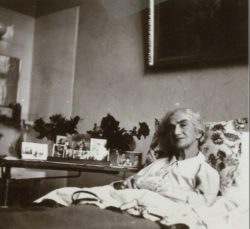My Holocaust research started with SW Germany, where my relatives were rounded up. My great-aunt, Hedwig Schwarz, was the only Jew to escape deportation in Horb/Rexingen. She was handicapped before the Holocaust, fell off the transport car, and was rescued by a nameless person who took her to Marienhopital in Stuttgart, where the nuns cared for her. My sister, daughter and I visited the hospital to thank the current generation of sisters for taking care of Hedwig. They told us that Hedwig was the only Jew in the hospital, though there were some Resistance members; and they treated her with silence, because they thought that was the best medicine. Can you imagine!
Here’s a poem I wrote about echoes in Horb and a photo of Hedwig in her hospital bed, surrounded by photos of all the others who were taken. The poem was first published in Prism: An Interdisciplinary Journal for Holocaust Educators, and in Packing Light: New and Selected Poems, Black Widow Press. 2009.

Mezuzah
In Memory, Hedwig Schwarz
In the doorpost of her house, a hollow
where the mezuzah used to hang.
I press my hand against the indentation,
my way of speaking to the past.
Touch the hollow where the mezuzah
used to hang. In Horb, Nazis renamed her street
Hitlerstrasse. My way of speaking to the past
is to listen, press the old men for answers.
1941, Jews were packed into Hitlerstrasse.
Now it’s a winding picture postcard road,
Jew-free, pleasant as it seemed
before Nazis pressed my family into Judenhausen.
I press my hand against the indentation.
Over Horb, a hundred doorposts echo, hollow.
I teach a poetry workshop in SW France for the Virginia Center for the Creative Arts. The moment I stepped out of the car, an elderly neighbor started to talk to me about the Jews who had lived there. That part of France was a hotbed for the Jewish Resistance. Dr. Hirsch, radiologist, was taken my Mengele to work on medical experiments (he testified against Mengele at Nuremburg). His wife Berthe was taken to Auschwitz and gassed; the two children were hidden by the villagers. I met one of them, Nicole Hirsch, who is still traumatized though she’s over 80. We think we know about the Holocaust, but the individual stories still want to be told.
- The Morels – by Marilyn Kallet - May 17, 2020
- The Biggest Blue Jay – Poem by Marilyn Kallet - April 16, 2020
- For International Holocaust Remembrance Day – Poem by Marilyn Kallet - January 7, 2018
